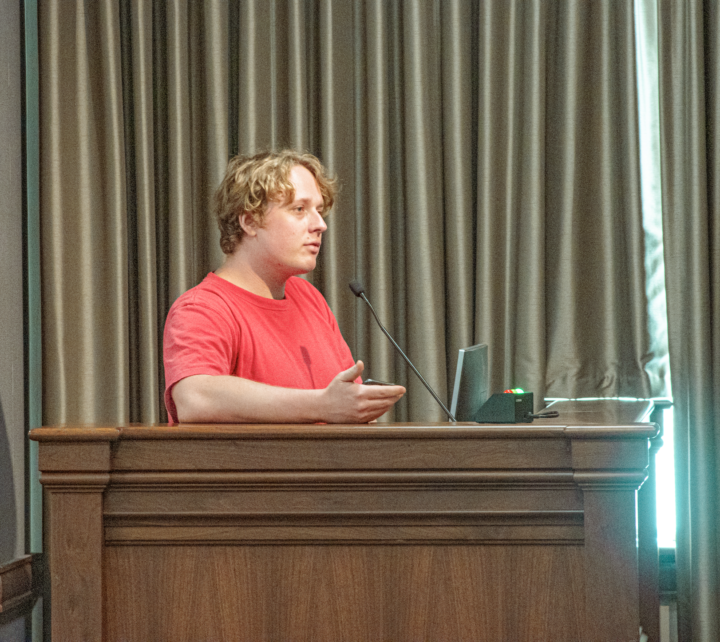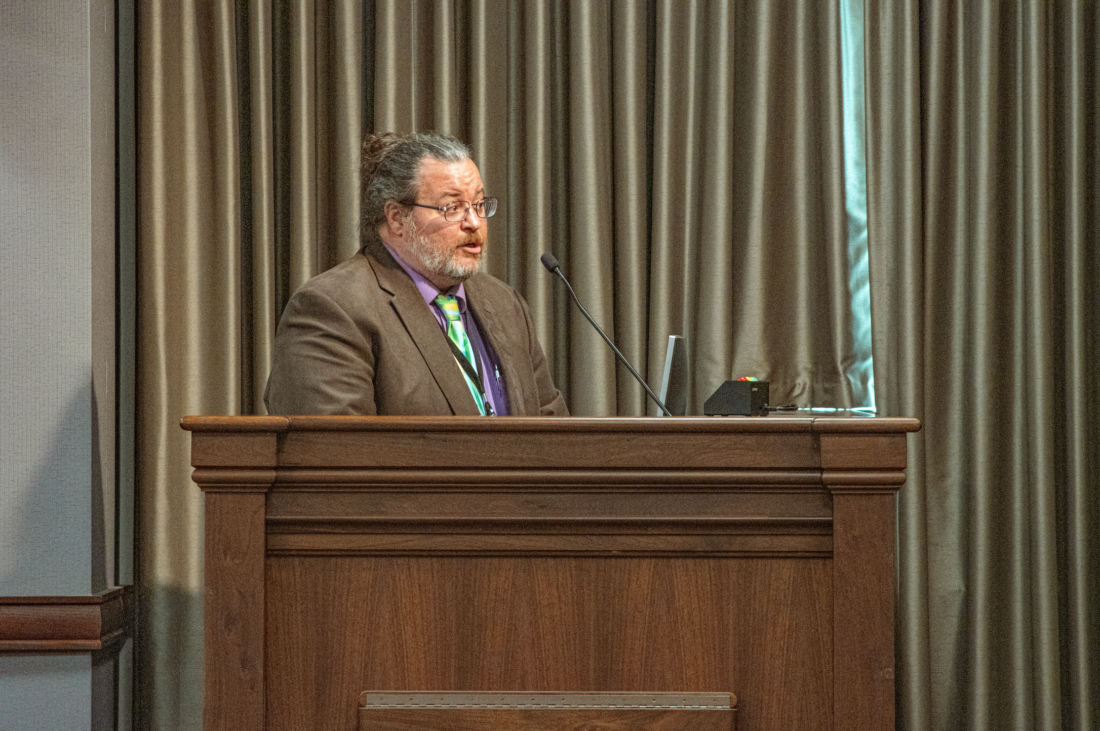Property taxes are going up for residents of Buncombe County. The county Board of Commissioners voted 6-0 on June 18 to approve a $440 million general fund budget for fiscal year 2024-25. Commissioner Amanda Edwards was not present.
The less than 1% increase in spending required commissioners to raise the tax rate by 1.96 cents per $100 of assessed value. The new rate — 51.76 cents per $100 of value — means the owner of a home valued at $400,000 will pay $2,070 in taxes to the county, $78 more than last year. (Owners of property located in municipalities or various other special districts such as fire districts or Asheville City Schools will pay more.)
Chair Brownie Newman said the decision to raise taxes is not easy, and this was the toughest budget season he’s been through in his 12 years on the commission.
“We’ve been coming through an era where cost of living has really gone up throughout our economy. The cost of housing is going up, the cost of everyday goods is going up and the cost of labor is going up. We’re mostly an organization made up of people. Our biggest investments are in our people who work for Buncombe County,” Newman said.
The budget includes a 4.89% cost-of-living increase for employees. Last year, employees received a 7.28% cost-of-living bump.
“When you go through two years of the largest cost-of-living increases that we’ve seen in many decades, that becomes a really big obligation,” Newman said. “And when that happens, and your revenues suddenly are really flat, the combination of those two things creates a real challenge.”
Budget Director John Hudson said the same goods and services cost 20% more than they did in 2014, on average. As a result, local governments across the state are facing similar challenges as Buncombe.
Education funding
As in previous years, the county’s largest expense is education. Buncombe County Schools, Asheville City Schools and A-B Tech will split $126 million, 29% of the overall county budget. Of the approved tax increase, 0.75 cents of it directly covers education spending increases.
For Buncombe County Schools (BCS), which will receive $98.9 million, and Asheville City Schools (ACS), which is getting $18.3 million, the modest increases over last year are far below the two districts’ requests.

BCS received $3.4 million of its $13.5 million request, while ACS got $600,000 instead of the $3.8 million bump it requested in part to help offset losses related to expiring COVID-era federal funding.
The Buncombe County Association of Educators (BCAE) recently held a rally, and supporters sent letters to commissioners, including 77 handwritten postcards, asking for an increased allocation from the county.
“Our students cannot afford the repercussions of an underfunded education system. They deserve better, and we have a collective responsibility to ensure they receive the best possible start in life,” said the letter sent to commissioners by BCAE.
Only one advocate turned to speak up for schools June 18, after no one came to the public hearing June 4.
According to Hudson, the county adopted a practice of annually increasing education spending at the county’s unrestricted growth rate — 3.52% this year — based on rising sales and property values. However, in response to school district requests, it has chipped in extra above and beyond that rate for schools every year since 2021, he said. Other than the 1-cent tax increase implemented last year to supplement education funding, there is no revenue to support $14.8 million in extra annual allocations for schools.
“Continuing to fund at this level is unsustainable. In fact, dedicated revenue to offset this increase would take a 2.77-cent tax rate increase,” he added.
Commissioner Al Whitesides said that while much of the blame for the state of education funding in Buncombe County lies with the N.C. General Assembly in Raleigh, the local school districts should do a better job of looking ahead to draft their budgets for the upcoming year.
“What we’re doing now is not working. We’re giving all that we can give when you look at our budget. We need to look at the future and how we do this because it’s important,” he said.
Commissioner Martin Moore suggested the districts and county look into a multiyear funding strategy.
Limiting the tax increase
Staff did make a few adjustments to County Manager Avril Pinder’s recommended budget since the June 4 public hearing in an effort to minimize the county’s tax increase.
Revenue projections increased by about $1.3 million, mainly due to a $1 million increase in expected investment earnings after the Federal Reserve announced that interest rates will stay the same for the remainder of the year, Hudson said.
The largest spending cut came from a $2 million cut to the Affordable Housing Services Program’s (AHSP) annual $2.3 million allocation.
The cut to affordable housing spending will not affect any programs in the pipeline in the upcoming fiscal year, according to Community Development Division manager Matt Cable. The program still has $370,000 left from last year’s budget and is allocating the first batch of funds from the $30 million general obligation bond funds approved by voters in 2022.
Despite the cut, Newman said he was proud of the county’s accomplishments on what he called its largest economic challenge.
“The whole time I’ve been here, this is one of these issues where it just seems like it just gets worse and worse every year,” Newman acknowledged. “I think we are now recognizing that we have strategies that can really work.”
Newman said he thinks the county will be able to triple the amount of new affordable homes that are built in the county each year in the next several years with the help of bond funds and money already earmarked from last year’s affordable housing budget.
“I’m excited that the county is part of these strategies that are really changing the outlook for people,” he added.




Of course they did.
So, let’s see. More tourists. More new residents and housing developments. More corporate giveaways. More traffic. Diminishing quality of life. Is this sustainable? What’s the endgame and where the hell are we heading?
As I have said before, we need to vote out our tax and spend commissioners and find individuals who do not continue to support out of control spending and want to consider the Buncombe County residents and their tax burdens. They have continued to spend more and more on pet projects. We need to get back to basics when it comes to funding. Vote them out!
Your outrage is laughable when your employer got an additional $300K in the budget. You need to calm down and maybe use a pseudonym on this public forum. I hope A-B Tech has a social media policy for its employees because your comments are not professional when the county helps fund A-B Tech. Don’t bite the hand that feeds you.
Henderson County passed their largest budget ever with no property tax increase. Hmmm…
I have a difficult supporting commissioners who allocate 2 million dollars for reparations. Surely, we have more important things to spend our tax dollars on.
Teachers are paid by the state yet more elderly people will have to sell their acreage to help fund teacher pay supplements from Buncombe county. Most surrounding counties pay little or no supplement. The 12.5-18% supplement Buncombe county paid under last year’s budget help’s recruit teachers from other poorer mountain counties. It has not been determined what the supplement will be for the coming year.
Raytheon. Baseball. Beer.
Vote the blathering gabbers out! If they go where they’re not know they can play their game again with a fresh bunch of suckers.